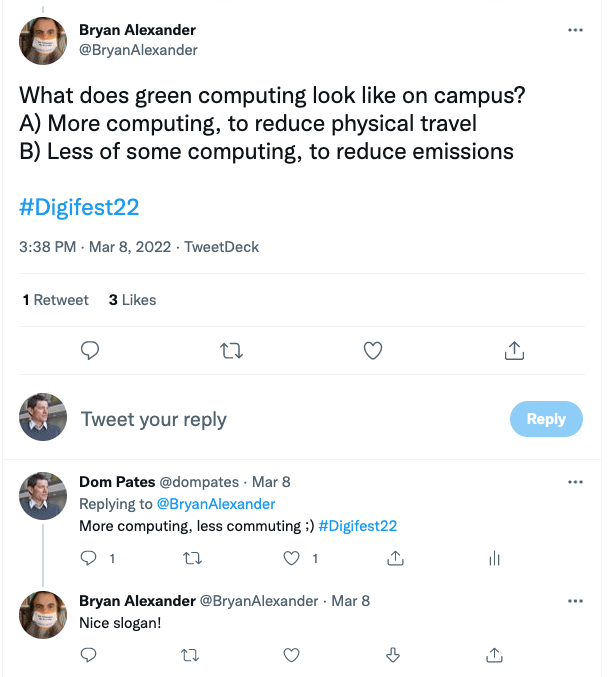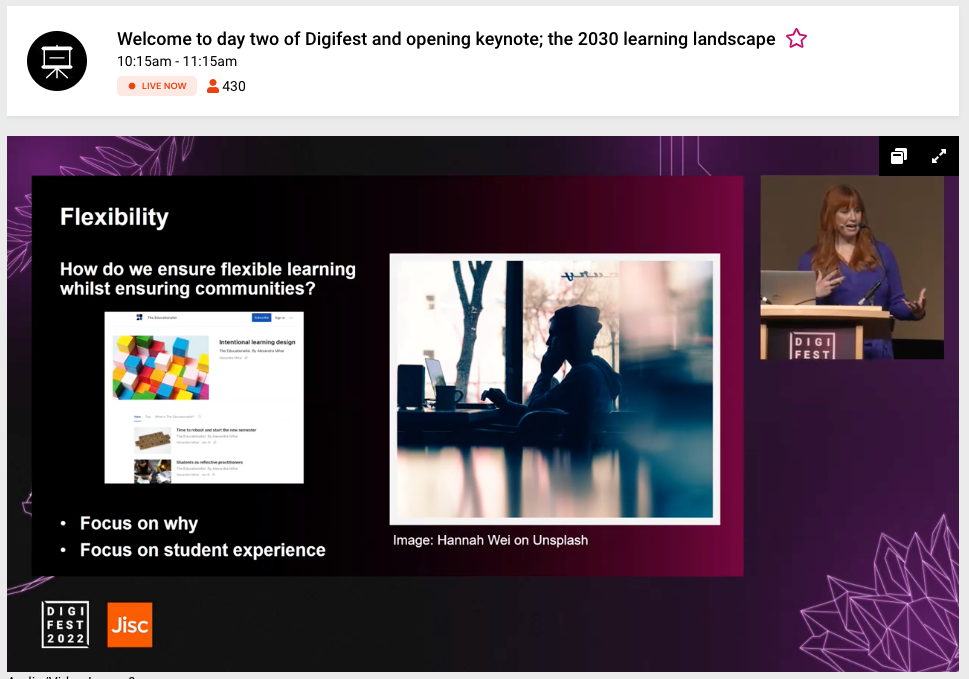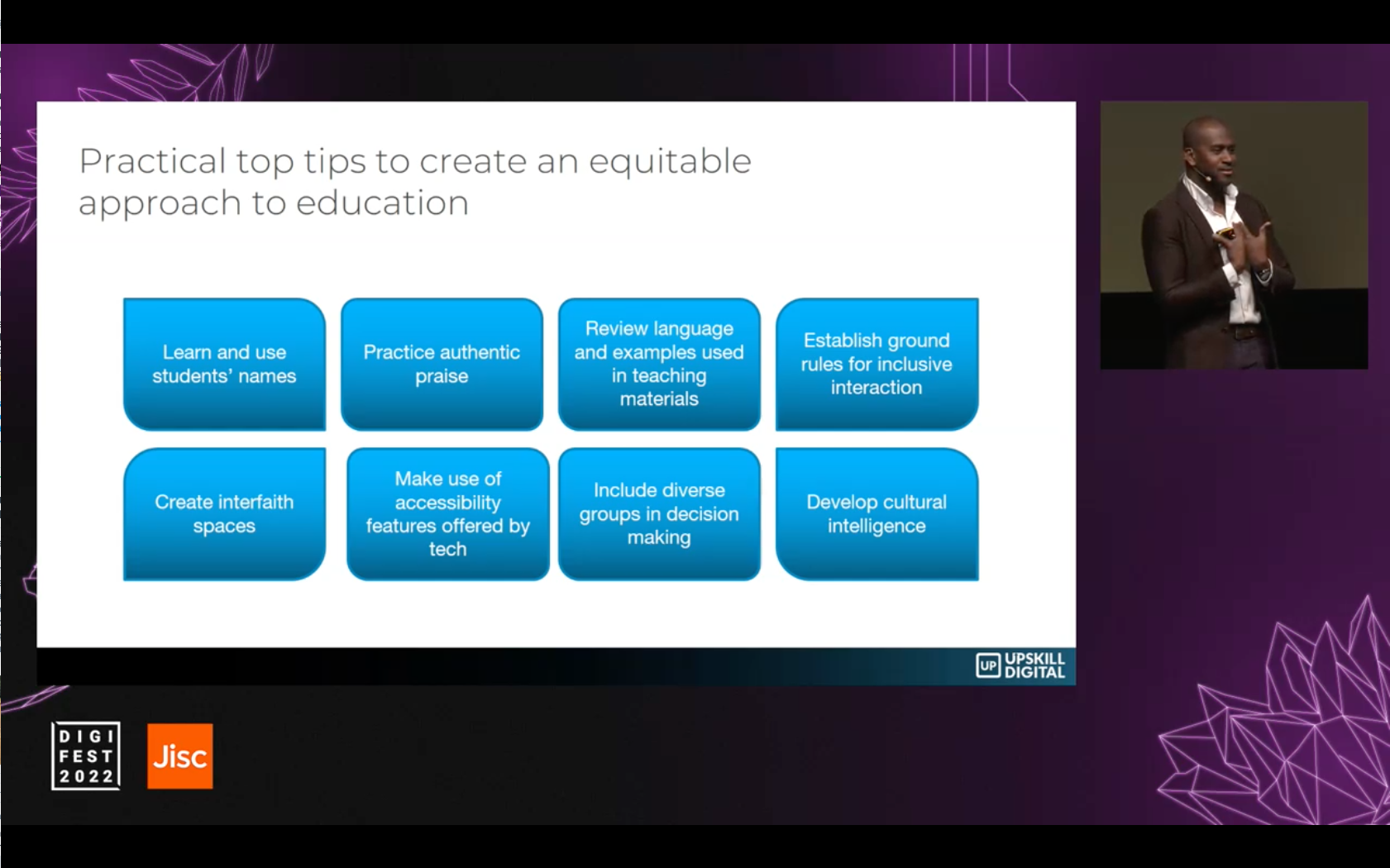In the HE digital education conferencing and events space, 2022 has been marked by gradual returns to in-person activities as well as, in some cases, their hybridisation. This was in sharp contrast to the emergency shift to online conferencing (or outright cancellation) that many saw in 2020 and the attempts to improve on and extend the possibilities for online conferencing in 2021.
I stepped cautiously back into my first in-person conference in a couple of years in March, with THE Digital Universities Week in London. There were no online components to the event and I largely sat at the back of the talks I attended, mostly still wearing a mask throughout and re-acclimatising to being back in the physical presence of friends, colleagues and others from my sector.
Although there weren’t large numbers of people flocking back to be in each other’s company again, there was nevertheless something great to be said for breaking out of solely screen-based work interactions and being able to stand around chewing the fat with familiar faces over a glass of wine. The social and serendipitous parts of a conference – often what brings much of the value of them to people – are at best difficult to replicate online. That said, I also spent a good chunk of my time at the conference in an online meeting as well as joining a virtual tour of hybrid learning spaces, organised by the Media & Learning Association, so it’s not as if I managed to break away from my screen entirely!
Jisc’s annual Digifest in 2022, run the week before THE Digital Universities, returned to in-person mode too. Unlike THE, however, there were remote access strands running throughout too, making it the first hybrid Digifest. I attended my first Digifest in 2021 with the event being fully online, so it was good to be able to dip back in to it amidst all the Teams meetings and other online gatherings in my calendar that week.
In the spirit of brevity, here’s a post with six screenshots of key takeaways I got from attending this year’s Digifest. View the full programme here.
Contents
1. Code Red: How can education respond to the climate emergency?

Cindy Forde is the founder of Planetari, an education platform aligned with the UN SDGs. She was attending Digifest remotely too, but was presenting rather than being in the audience. Forde used her session to pose some profoundly difficult questions for addressing some of the most challenging issues of our times towards drawing new maps for a brighter world.
It was good to see educational responses to the climate emergency starting to be given bigger platforms at events such as this. I was also struck by her highlighting of the importance of universities for the future with the statistic that ‘globally around 3% of people attend university but they take up 80% of leadership positions’. This places, I feel, a far greater responsibility on universities than just getting students through a degree – we must ensure that we foster ‘world-ready graduates’ (to coin a phrase I’ve picked up somewhere else this year).

2. Tweeting the panel
The climate emergency was also tackled in a panel discussion in the afternoon, going all in on the hybridity front with both a mixed mode panel of remote and in-person panelists as well as a mixed mode audience. The topic was ‘a digital technology lens on where we are with the campus sustainability agenda, and the opportunities and barriers as we go forward to a net zero world’.
One of the panelists was HE futurist Bryan Alexander of Georgetown University. I had a brief exchange with him on Twitter while his panel was live, inadvertently coining a slogan around ‘more computing, less commuting’. A tweet exchange with a conference speaker while they are on stage was probably a first (for me) of some sort!
3. Flexibility and community

The opening keynote on Day Two came from Dr Sarah Jones, associate pro-vice chancellor education at Leicester De Montford University. Jones’s keynote looked to present a picture of what university education could look like by 2030 as we collectively emerge from the traumas of multiple lockdowns and a major pandemic.
I liked the simplicity of the question and answers from this slide from her keynote as, despite the simplicity of the language, there was a lot to unpack in it. Essentially, she was getting at the importance of not losing what HE has gained by the forced move of education online at speed and scale, seeing the flexibility that this provided students as vital. However, the absence of campus activities, the serendipitous interactions that a university education can provide (as, in smaller ways, an in-person conference can also provide) and other factors that foster community are far harder to design and build for online.
It’s no bad thing at all if the pandemic has forced us all to pay more attention to ‘student experience’, I’d say, as it looks at making universities more purposefully experiential than they might otherwise have been. Dr Jones was also making the case for intentional learning design, which I’d say is also no bad thing.
4. Equitable education from digital upskilling

Gori Yahaya, the founder and CEO of UpSkill Digital, delivered some practical tips for creating a more equitable approach to education. While the tips in this slide are very useful for making teaching more inclusive, I think they also apply more broadly in other contexts too, from running meetings to managing teams. They are as follows:
- Learn and use students’ names
- Practice authentic praise
- Review language and examples used in teaching materials
- Establish ground rules for inclusive interaction
- Create interfaith spaces
- Make use of accessibility features offered by tech
- Include diverse groups in decision making
- Develop cultural intelligence
I was pleased to see that large sectoral events such as Digifest are now elevating issues such as the importance of diversity and inclusivity or tackling the climate crisis. Technology is never neutral, and these are equivalent strands towards building a better future than just ‘more (or better) digital’.
5. Interdisciplinarity
I’ve long been curious about the London Interdisciplinary School (LIS), a higher education provider founded in 2017 that is the first new institution in the UK since the 1960s to hold full degree-awarding powers. LIS eschews traditional academic disciplines (or silos, as the criticism goes) to focus on a problem-based learning approach to tackling complex global problems via interdisciplinary teaching methods.
CEO Ed Fidoe explained the LIS approach from the Digifest stage. I’ve chosen two of his slides that really stood out for me. The first was a simple visualisation of how many subjects are traditionally taught, from GCSE to undergraduate degrees. His graphic suggested that a traditional education has plenty of breadth, but very limited depth. Whether you would agree or disagree with this assessment, I think it certainly makes for an arresting framing of a general education.

The second visualisation I found even more interesting. This was essentially how a module is designed at LIS, anchored by a specific problem, looking at that problem via multiple disciplinary lenses, and having strands running throughout that encouraged the application of both quantitative and qualitative research methods.

If I were 17 today and looking at where to go after my A Levels, I suspect that I’d be clamouring for a place at LIS!

Thanks for sharing your takeaways from Digifest. I agree I think I’d be clamouring for a place at LIS too! What a great model – interesting how data science and basic coding is being recognised as an essential skillset for many disciplines now, with Big Data everywhere, its not really surprising! Did anyone talk about or use the term ‘HyFlex’?
Indeed – core skills for the new world 🙂
‘HyFlex’ is bandied about quite a bit these days as a term, along with ‘hybrid’ (which we prefer at City). Hyflex in my mind has a bit more of a specific historical association, and hybrid is a bit looser a term: in-person or online in real time rather than in-person or online in real time AND students can choose whichever they want at any given time. It’s always felt a bit too loose for planning purposes to me.